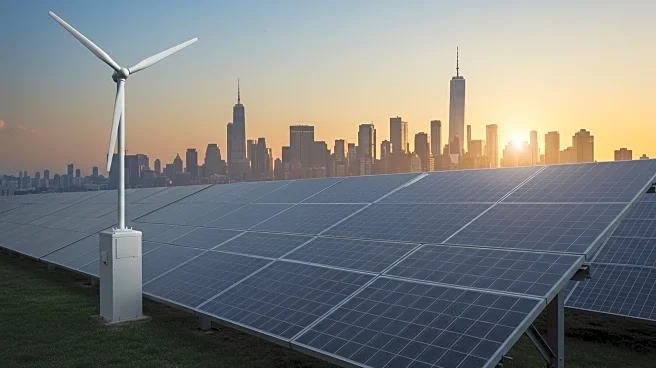What's Happening?
The Internal Revenue Service (IRS) has released guidance in the form of frequently asked questions (FAQs) regarding the expiration of tax credits for clean energy sources. These credits, which include incentives for solar and wind power, electric vehicles, and energy-efficient buildings, are set to expire under the One Big Beautiful Bill Act (OBBBA). The OBBBA reversed many of the green energy tax incentives previously offered under the Biden administration's Inflation Reduction Act, favoring the fossil fuel industry instead. Following the bill's signing, the Trump administration issued an executive order and further guidance from the Treasury Department to end many of these tax breaks early by redefining when a project is considered to have begun construction. Despite these changes, some wind and solar energy companies have performed well in the stock market, as the new requirements were not as stringent as anticipated.
Why It's Important?
The expiration of these clean energy tax credits marks a significant shift in U.S. energy policy, potentially impacting the renewable energy sector and its stakeholders. By favoring fossil fuels, the policy change could slow the growth of renewable energy projects, affecting companies involved in solar and wind energy production. This shift may also influence the broader energy market, potentially leading to increased reliance on fossil fuels and affecting the U.S.'s ability to meet climate goals. The guidance provided by the IRS is crucial for businesses and individuals involved in clean energy projects to understand the new landscape and adjust their strategies accordingly.
What's Next?
As the clean energy tax credits expire, stakeholders in the renewable energy sector may need to reassess their investment and development plans. Companies might seek alternative funding sources or adjust their business models to adapt to the changing policy environment. Additionally, there could be political and public responses to these changes, potentially influencing future legislative actions or prompting advocacy for the reinstatement of clean energy incentives. The ongoing dialogue between policymakers, industry leaders, and environmental groups will likely shape the future of U.S. energy policy.









